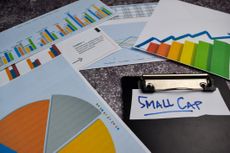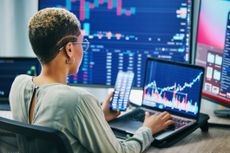Covid-19: Second wave grows as US election nears
The second wave of Covid-19 is buffeting global stock indices, while US markets remain focused on the presidential election polls.

Soaring numbers of Covid-19 cases and talk of new lockdowns in Europe resulted in the worst day in a month for America’s S&P 500 on Monday, with the index falling by 1.9%. Germany’s Dax had a shocker, plunging by more than 4% over the first two trading days of the week.
This is a Covid-19 “reality check”, say Matt Phillips and Eshe Nelson in The New York Times. With cases also on the rise in America, investors are finally grasping what more lockdowns will mean for earnings, says Matt Maley of asset manager Miller Tabak + Co. The US Senate adjourned this week, all but killing hopes of a pre-election stimulus deal. The Vix index, Wall Street’s “fear” gauge measuring expected volatility, has hit its highest level since the early September market wobbles.
Premature election party
US markets remain focused on election polls showing Democrats are on course to win control of the presidency and both houses of Congress. As a recent Goldman Sachs note puts it, such a “blue wave” would probably lead to a “sizeable Covid-19 relief package on the order of $2.5trn (12% of GDP)” in the first quarter of next year, reports Daniel Tenreiro for National Review Capital Matters. With both parties deadlocked over a new stimulus bill (and a Republican “red wave” all but impossible) Wall Street is backing blue “for the first time in recent memory”.
Subscribe to MoneyWeek
Subscribe to MoneyWeek today and get your first six magazine issues absolutely FREE

Sign up to Money Morning
Don't miss the latest investment and personal finances news, market analysis, plus money-saving tips with our free twice-daily newsletter
Don't miss the latest investment and personal finances news, market analysis, plus money-saving tips with our free twice-daily newsletter
Hold the pre-election “party”, says Justin Lahart in The Wall Street Journal. The bet is that the sheer scale of a Democrat spending boost would more than outweigh the drag of higher taxes. That might be true for the economy overall, but corporate profits are another matter. Biden wants to raise the corporate tax rate from 21% to 28% and bring in a raft of other unfavourable tax and regulatory changes. The one bright spot is that fears of a contested presidential election have receded somewhat as Biden has pulled away in the polls, although it remains a possibility.
Less disruption and “Trump noise”?
Analysts also note that the end of the Trump era would mean less trade disruption and less “Trump noise”, writes Ben White for Politico. But what they really care about is more stimulus. There is still a decent chance that Biden takes the presidency but Republicans cling onto the Senate. That would probably hit equities, as it makes more stimulus difficult to agree but still exposes businesses to tougher regulation from the executive branch.
The US election is bad for “the mental, cardiovascular or intestinal health” of many of us, says John Authers on Bloomberg. But this is one of those times when politics really is driving markets. As John Velis of Bank of New York Mellon Corp puts it, this is a case of “political risk on steroids”. The current “reflation trade” – the widespread idea that we are heading for higher growth, higher inflation and a weaker dollar over the coming years – amounts to one huge bet about what happens next Tuesday.
-
 UK inflation slowed again in March – but a rate cut could be some months away
UK inflation slowed again in March – but a rate cut could be some months awayThe latest Consumer Price Index (CPI) data came in at 3.2% for March. This was slightly higher than some economists expected, but takes us closer to the Bank of England’s 2% inflation target.
By Katie Williams Published
-
 Pension vs property: which option provides the best income for your retirement?
Pension vs property: which option provides the best income for your retirement?News With the cost of a comfortable retirement on the rise, future retirees need to weigh up which strategy offers the best returns. But is a pension a better bet than property?
By Henry Sandercock Published
-
 The industry at the heart of global technology
The industry at the heart of global technologyThe semiconductor industry powers key trends such as artificial intelligence, says Rupert Hargreaves
By Rupert Hargreaves Published
-
 Three emerging Asian markets to invest in
Three emerging Asian markets to invest inProfessional investor Chetan Sehgal of Templeton Emerging Markets Investment Trust tells us where he’d put his money
By Chetan Sehgal Published
-
 What to consider before investing in small-cap indexes
What to consider before investing in small-cap indexesSmall-cap index trackers show why your choice of benchmark can make a large difference to long-term returns
By Cris Sholto Heaton Published
-
 Why space investments are the way to go for investors
Why space investments are the way to go for investorsSpace investments will change our world beyond recognition, UK investors should take note
By Merryn Somerset Webb Published
-
 Time to tap into Africa’s mobile money boom
Time to tap into Africa’s mobile money boomFavourable demographics have put Africa on the path to growth when it comes to mobile money and digital banking
By Rupert Hargreaves Published
-
 M&S is back in fashion: but how long can this success last?
M&S is back in fashion: but how long can this success last?M&S has exceeded expectations in the past few years, but can it keep up the momentum?
By Rupert Hargreaves Published
-
 The end of China’s boom
The end of China’s boomLike the US, China too got fat on fake money. Now, China's doom is not far away.
By Bill Bonner Published
-
 Magic mushrooms — an investment boom or doom?
Magic mushrooms — an investment boom or doom?Investing in these promising medical developments might see you embark on the trip of a lifetime.
By Bruce Packard Published